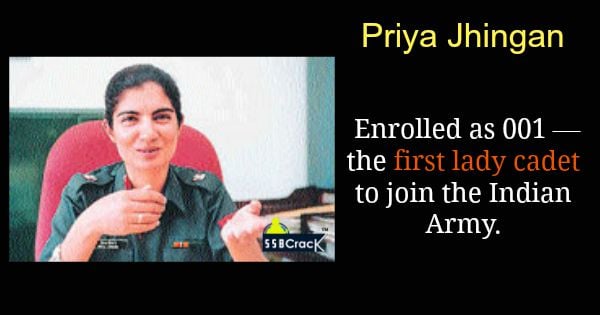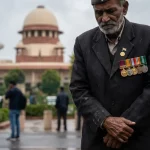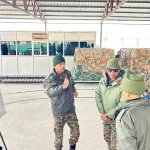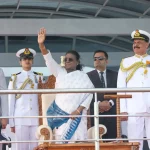A decade ago, on 21 September 1992, the feisty Priya Jhingan enrolled as 001 — the first lady cadet to join the Indian Army. “It’s a dream I have lived every day for the last 10 years,” says Jhingan, formerly OIC, Judge Advocate General, at the Chennai headquarters. That dream ended two days ago for her and 24 of her batch-mates who served out their 10-year commission. Jhingan does not want to think too much about what life’s going to be like here on end. She’s applying to various banks for administrative jobs. Returning to the dream, she says it was her single-mindedness that won her an entry into the Army. Soon after she finished her graduation, she wrote a letter to the then Chief of Army Staff, General Sunith Francis Rodrigues, requesting him to open the doors of the armed services to women.
The General wrote back saying the Army was planning to induct women in a year or two. Jhingan dropped all plans of becoming a police officer — her father was one — and decided to wait till the Army called her. “The signed letter from the General remains one of my prized possessions,” says Jhingan. To bide her time, she studied law. When the full-page advertisement inviting women to join the Army appeared in 1992, she knew she would make it. “There were two seats reserved for law graduates. I was just curious to find out who the other person might be.” Jhingan was right. Soon, she came down to the Officers Training Academy (OTA) in Chennai. The batch of 25 spirited women did not know what to expect and did not have much of an introduction. So, they walked into the OTA with their trunks filled with fancy clothes they thought they would wear to all the social dos. With a shake of her head, Jhingan says, “Our commanding officer almost hit the roof when he saw our trunks and the list of requests — warm water, tube lights and a saloon.”

A rigorous physical training with stringent standards that matched the male cadets wasn’t a problem, says Jhingan. She is unhappy that the standards for ladies have been lowered now. “It is no longer challenging.” The parallel training, however, did create some awkward moments for the shy lady cadets who never imagined they would have to get into the same swimming pool as the gentleman cadets or train under the watchful eyes of male officers. “We wrapped the towels tightly around us and refused to let go of them. Finally, our platoon commander Captain P S Behl had to come and order us to stand in attention. The towels fell and we marched forward,” says Jhingan, embarrassed by the memory. In her first posting at Ahmedabad, there was only one toilet and she had to share it with other male officers, but she didn’t let that bother her. “Often, I would go in and see someone else using the facility. So, soon I devised the system of knocking hard on the door before entering. But never once did I think that I should be allotted a separate facility,” she says. When a sozzled jawan entered her room five years ago, she gave him a good thrashing. He was later court-martialed and booted out.

Jhingan waves away the initial apprehension of male officers that women were inducted just to ‘add colour’ to the Army. She explains their refusal to call her m’aam as just one of the “problems that every working woman faces while breaking stereotypes.” But this mother of a five-year-old son, Aryaman, is willing to admit that her priorities have changed. “I am always thinking of what will be a good move for my son,” she says. Ask her whether the Army took the right decision in curtailing the lady officers’ service to 10 years, she will shoot back, “No way. Why should they decide what is right for me and my family?” She did not write to Army HQ seeking an extension because, “I never want to tell the Army not to detail me in for a case because I have other personal obligations. I can never do that.” When Jhingan was commissioned on 06 March 1993, she requested that she be posted in the infantry. Her commanding officer told her may be her great-grand-daughter would get a chance to serve in the infantry. “I am waiting for that day,” she says.
A decade ago, on 21 September 1992, the feisty Priya Jhingan enrolled as 001 — the first lady cadet to join the Indian Army. “It’s a dream I have lived every day for the last 10 years,” says Jhingan, formerly OIC, Judge Advocate General, at the Chennai headquarters. That dream ended two days ago for her and 24 of her batch-mates who served out their 10-year commission. Jhingan does not want to think too much about what life’s going to be like here on end. She’s applying to various banks for administrative jobs. Returning to the dream, she says it was her single-mindedness that won her an entry into the Army. Soon after she finished her graduation, she wrote a letter to the then Chief of Army Staff, General Sunith Francis Rodrigues, requesting him to open the doors of the armed services to women.
The General wrote back saying the Army was planning to induct women in a year or two. Jhingan dropped all plans of becoming a police officer — her father was one — and decided to wait till the Army called her. “The signed letter from the General remains one of my prized possessions,” says Jhingan. To bide her time, she studied law. When the full-page advertisement inviting women to join the Army appeared in 1992, she knew she would make it. “There were two seats reserved for law graduates. I was just curious to find out who the other person might be.” Jhingan was right. Soon, she came down to the Officers Training Academy (OTA) in Chennai. The batch of 25 spirited women did not know what to expect and did not have much of an introduction. So, they walked into the OTA with their trunks filled with fancy clothes they thought they would wear to all the social dos. With a shake of her head, Jhingan says, “Our commanding officer almost hit the roof when he saw our trunks and the list of requests — warm water, tube lights and a saloon.”
A rigorous physical training with stringent standards that matched the male cadets wasn’t a problem, says Jhingan. She is unhappy that the standards for ladies have been lowered now. “It is no longer challenging.” The parallel training, however, did create some awkward moments for the shy lady cadets who never imagined they would have to get into the same swimming pool as the gentleman cadets or train under the watchful eyes of male officers. “We wrapped the towels tightly around us and refused to let go of them. Finally, our platoon commander Captain P S Behl had to come and order us to stand in attention. The towels fell and we marched forward,” says Jhingan, embarrassed by the memory. In her first posting at Ahmedabad, there was only one toilet and she had to share it with other male officers, but she didn’t let that bother her. “Often, I would go in and see someone else using the facility. So, soon I devised the system of knocking hard on the door before entering. But never once did I think that I should be allotted a separate facility,” she says. When a sozzled jawan entered her room five years ago, she gave him a good thrashing. He was later court-martialed and booted out.
Jhingan waves away the initial apprehension of male officers that women were inducted just to ‘add colour’ to the Army. She explains their refusal to call her m’aam as just one of the “problems that every working woman faces while breaking stereotypes.” But this mother of a five-year-old son, Aryaman, is willing to admit that her priorities have changed. “I am always thinking of what will be a good move for my son,” she says. Ask her whether the Army took the right decision in curtailing the lady officers’ service to 10 years, she will shoot back, “No way. Why should they decide what is right for me and my family?” She did not write to Army HQ seeking an extension because, “I never want to tell the Army not to detail me in for a case because I have other personal obligations. I can never do that.” When Jhingan was commissioned on 06 March 1993, she requested that she be posted in the infantry. Her commanding officer told her may be her great-grand-daughter would get a chance to serve in the infantry. “I am waiting for that day,” she says.













